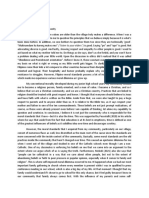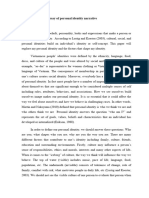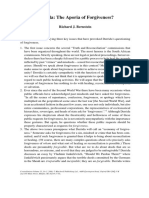0 ratings0% found this document useful (0 votes)
Who Am I
Who Am I
Uploaded by
api-2794207671) The author discusses how their beliefs, values, and morals were shaped from a young age by their family, particularly their father who was a preacher. Faith and family were strongly emphasized.
2) Growing up in a preacher's household influenced the author to develop a close relationship with God at an early age. They were taught important life lessons about respect, responsibility, and work ethic.
3) The author acknowledges they have biases due to their upbringing, such as feeling more sympathetic towards black people and women. Their views have been shaped by friends, family, and society. They are working to understand other cultures rather than make assumptions.
Copyright:
© All Rights Reserved
Available Formats
Download as DOCX, PDF, TXT or read online from Scribd
Download as docx, pdf, or txt
Who Am I
Who Am I
Uploaded by
api-2794207670 ratings0% found this document useful (0 votes)
1) The author discusses how their beliefs, values, and morals were shaped from a young age by their family, particularly their father who was a preacher. Faith and family were strongly emphasized.
2) Growing up in a preacher's household influenced the author to develop a close relationship with God at an early age. They were taught important life lessons about respect, responsibility, and work ethic.
3) The author acknowledges they have biases due to their upbringing, such as feeling more sympathetic towards black people and women. Their views have been shaped by friends, family, and society. They are working to understand other cultures rather than make assumptions.
Original Title
who am i
Copyright
© © All Rights Reserved
Available Formats
DOCX, PDF, TXT or read online from Scribd
Share this document
Did you find this document useful?
Is this content inappropriate?
1) The author discusses how their beliefs, values, and morals were shaped from a young age by their family, particularly their father who was a preacher. Faith and family were strongly emphasized.
2) Growing up in a preacher's household influenced the author to develop a close relationship with God at an early age. They were taught important life lessons about respect, responsibility, and work ethic.
3) The author acknowledges they have biases due to their upbringing, such as feeling more sympathetic towards black people and women. Their views have been shaped by friends, family, and society. They are working to understand other cultures rather than make assumptions.
Copyright:
© All Rights Reserved
Available Formats
Download as DOCX, PDF, TXT or read online from Scribd
Download as docx, pdf, or txt
0 ratings0% found this document useful (0 votes)
Who Am I
Who Am I
Uploaded by
api-2794207671) The author discusses how their beliefs, values, and morals were shaped from a young age by their family, particularly their father who was a preacher. Faith and family were strongly emphasized.
2) Growing up in a preacher's household influenced the author to develop a close relationship with God at an early age. They were taught important life lessons about respect, responsibility, and work ethic.
3) The author acknowledges they have biases due to their upbringing, such as feeling more sympathetic towards black people and women. Their views have been shaped by friends, family, and society. They are working to understand other cultures rather than make assumptions.
Copyright:
© All Rights Reserved
Available Formats
Download as DOCX, PDF, TXT or read online from Scribd
Download as docx, pdf, or txt
You are on page 1/ 4
Tony Miller, Jr.
Multiculturalism on College Campuses
Autoethnography Part 1
Dr. Wilson
Who Am I?
So many times people are asked the question who are you over the entire course of
their lifetime. Many people answer this question by simply stating their name, age, and where
they are from. I have learned who I am is much more than those things. From a multicultural
perspective, my beliefs, values, morals, and biases have all been shaped by my family, friends,
and everything around me. The world plays a major role in what we believe in and how we view
different things. There are different influences in our lives that shape what we believe and why
we believe them. I think our beliefs, values, morals, and biases are the foundation of what makes
us who we are.
When people think about a house, the first thing they think about is how beautiful it is,
how big it is, or how much it cost. However, many fail to realize the true reason why it is
possible for that beautiful house to be so big and cost so much. What is often overlooked in
many buildings, cars, and even people is the underlying foundation. The framework of the
previously mentioned items plays a major role in their effectiveness when it comes to doing what
they are supposed to do.
When it comes to the foundation of people, it is a little different from the foundation of a
house, car, or building. These three objects are built from the ground or bottom up. In a human,
our foundation is established from the beginning of our life or our metaphorical ground or
bottom. Human foundation comes down to our morals, values, and beliefs.
My life started as any child's life would start. I came into this world happy, free, and
without a care in the world. Although I am an African American male, I was fortunate enough to
have a set of parents who were married and the fact that I saw my father everyday already set me
apart from most of my peers and what society expected for an African American male. As I was
Tony Miller, Jr.
Multiculturalism on College Campuses
Autoethnography Part 1
Dr. Wilson
growing up I know my family helped shape my beliefs, values, morals, and biases. Faith was
instilled in me from the very first day I can remember.
When I was 4 years old my father was called into the ministry and my life was never the
same again. I had stepped into a fraternity of children who can only speak from their personal
experiences about how tough living the lifestyle of a preachers kid can be. My childhood may
have been a little different if my dad had not become a preacher, but I believe the principles that
my baby sister and I were raised on would have been very similar, the only difference would be
that our public behavior would be examined closer due to the status of our father. My view of
certain things were just different because dad was a preacher.
I believe this lifestyle allowed me to develop a closer relationship with Christ at an earlier
age than most kids due to my given circumstance. I was taught how to pray, I was taught the
importance of tithes and offering, I was taught all the Bible stories, and developed an
understanding for their significance in our everyday lives. I was taught by my family that God
came first and then family. I was taught to respect everyone I come in contact with. I was taught
to respect my elders, treat women fairly and equally. I was taught important life lessons at an
early age that allowed me to be prepared for situations that would arise as I got older. I was
taught not to judge a book by its cover. I was taught the importance of family and the
importance of genuine relationships. My parents always taught me to work hard for everything I
wanted and to never settle for second place. The top values in my life are my faith, family,
friends, discipline, leadership, success, and service.
My morals come from my parents, but my dad helped me understand things in a deeper
and more intense way. He made sure that I understood what accountability is, he made sure that
I understood what being a man is, he made sure I understood what responsibility and
commitment is because he knew that it was his job to do as my father. He was aware of the
Tony Miller, Jr.
Multiculturalism on College Campuses
Autoethnography Part 1
Dr. Wilson
impact he would have on my life so he tried to lay the foundations of what he learned and
understood it would take in order to become a productive citizen in this world.
I have also developed some beliefs, values, and biases from my friends or peers as well.
Although the word bias is not looked at as a positive word, a person can have positive biases
about a person or a group of people. I think a lot of the stereotypes we have for people different
from us or even people just like us gives us our validation for the biases we have. I am bias
towards black people because I am a part of that particular group. However, when it comes to
the matter of someone defending themselves I am more bias or sympathetic for women because I
feel that a man should be able to defend himself since he is man. This type of thought process
comes from friends, family, and society.
Another example of my bias for black women, I find myself more bias to black women
because I am a black and I also understand how tough it is to live in this world as a black man,
and I can only imagine how tough it is to live in this world as a black woman since they are the
minority of the minority. Once again I was given this belief based off the family and friends that
I have been around my entire life. I was taught and have always believed that you take care of
your people first. When I have conversations with my friends about certain topics or issues, we
always take race or gender into account because we have all been shaped that way. I do not
believe we are racist or prejudice, it is just something we are used to doing and those factors
actually give us rationale as to why this person may have done this in that situation opposed to
that in this situation.
I think everything stated above is culturally significant because it allows me to
understand where I am from and why I do what I do the way that I do it. Both sides of my
family have many of the same values and beliefs, such as faith in God and placing family right
behind our faith because we believe that family is the one constant and consistent thing we can
Tony Miller, Jr.
Multiculturalism on College Campuses
Autoethnography Part 1
Dr. Wilson
depend on. This is also significant to my culture because it tells me how the people in my family
are and it allows me to carry on both family legacies proudly and understand where and what my
end goal should be.
I am well aware that I do not know everything about all the different races and cultures in
the world, but I still have beliefs and stereotypes about many. Earlier in my life and even
sometimes still today, I make judgments about people who are different than me, not because
they have done anything to me, but because I just do. I believe along with everyone else we start
to make assumptions about people we do not know because we do not understand why they are
doing whatever they are doing. I have learned the best way to avoid hurting feelings or making
assumptions is to read and investigate different cultures so we may understand the reasons why
people different from us do the things we do. I am sure just as we assume things about them or
wonder why they believe what they believe, they are doing the same thing to us because they do
not understand our culture or way of living either.
When people seek out to understand instead of seeking to critique awareness of different
cultures will be easier to learn about. I have also learned that waiting to get to know someone
before we cast judgments on their lifestyle can help tremendously. Often times when we meet
someone different from us and we actually take the time to get to know them as a person, we
learn they are not bad as a person as we first perceived. So take the time to learn about someone
elses beliefs and values, because our feelings would be hurt if people looked down on what we
have believed and been taught our entire lives if we were treated the same way we treat others
who appear to be different from us.
You might also like
- What Is Philosophy - Dietrich Von Hildebrand PDF100% (3)What Is Philosophy - Dietrich Von Hildebrand PDF251 pages
- The 120 Club - Living the Good Life for 120 Years: Health and Vitality in an Age of TransformationFrom EverandThe 120 Club - Living the Good Life for 120 Years: Health and Vitality in an Age of TransformationNo ratings yet
- Craig Furnivall Honors 390P Doctor Woodward Exploration of Self-IdentityNo ratings yetCraig Furnivall Honors 390P Doctor Woodward Exploration of Self-Identity17 pages
- The Evolution of Her: Redefining Your Beliefs about Your Feminine IdentityFrom EverandThe Evolution of Her: Redefining Your Beliefs about Your Feminine IdentityNo ratings yet
- Freedom: What Is the Experience of Living Without Negative Self-Imposed Limitations?From EverandFreedom: What Is the Experience of Living Without Negative Self-Imposed Limitations?No ratings yet
- Assignment - Personal Ethical Journey Reflection - EsquivelNo ratings yetAssignment - Personal Ethical Journey Reflection - Esquivel4 pages
- ALA - Cultural Diversity Building CommunityNo ratings yetALA - Cultural Diversity Building Community9 pages
- Pretty Young: Being Unapologetically Female in a Man's WorldFrom EverandPretty Young: Being Unapologetically Female in a Man's WorldNo ratings yet
- Roommate Agreement-Behavioral ExpectationsNo ratings yetRoommate Agreement-Behavioral Expectations4 pages
- IGNOU Social and Political Thoughts (MPSE-004)No ratings yetIGNOU Social and Political Thoughts (MPSE-004)188 pages
- The Reference Qatar Papers" Reveals The Scandals of The Qatar Charity Foundation in EuropeNo ratings yetThe Reference Qatar Papers" Reveals The Scandals of The Qatar Charity Foundation in Europe4 pages
- 1this Is My Body + Wonderful Merciful Savior + TheNo ratings yet1this Is My Body + Wonderful Merciful Savior + The2 pages
- "Simple Gifts" - Joseph Brackett (1797-1882)No ratings yet"Simple Gifts" - Joseph Brackett (1797-1882)2 pages
- Question: in A 2005 Book, Yale University Historian Peter Perdue Argued That This Event WasNo ratings yetQuestion: in A 2005 Book, Yale University Historian Peter Perdue Argued That This Event Was10 pages
- The 120 Club - Living the Good Life for 120 Years: Health and Vitality in an Age of TransformationFrom EverandThe 120 Club - Living the Good Life for 120 Years: Health and Vitality in an Age of Transformation
- Craig Furnivall Honors 390P Doctor Woodward Exploration of Self-IdentityCraig Furnivall Honors 390P Doctor Woodward Exploration of Self-Identity
- The Evolution of Her: Redefining Your Beliefs about Your Feminine IdentityFrom EverandThe Evolution of Her: Redefining Your Beliefs about Your Feminine Identity
- Breaking the Cycle: A Collection of Creative WorksFrom EverandBreaking the Cycle: A Collection of Creative Works
- Slut!: Letting Go of Shame Surrounding Sex and SexualityFrom EverandSlut!: Letting Go of Shame Surrounding Sex and Sexuality
- Freedom: What Is the Experience of Living Without Negative Self-Imposed Limitations?From EverandFreedom: What Is the Experience of Living Without Negative Self-Imposed Limitations?
- Assignment - Personal Ethical Journey Reflection - EsquivelAssignment - Personal Ethical Journey Reflection - Esquivel
- You're On Your Own: A Mother's Letters on Life to Her SonsFrom EverandYou're On Your Own: A Mother's Letters on Life to Her Sons
- Pretty Young: Being Unapologetically Female in a Man's WorldFrom EverandPretty Young: Being Unapologetically Female in a Man's World
- Striving for Greatness: Living, Loving, and LearningFrom EverandStriving for Greatness: Living, Loving, and Learning
- Broken-heartedness: Towards love in professional practiceFrom EverandBroken-heartedness: Towards love in professional practice
- Golden Mynd: Reclaiming Your Greatness You Were Born WithFrom EverandGolden Mynd: Reclaiming Your Greatness You Were Born With
- The Reference Qatar Papers" Reveals The Scandals of The Qatar Charity Foundation in EuropeThe Reference Qatar Papers" Reveals The Scandals of The Qatar Charity Foundation in Europe
- 1this Is My Body + Wonderful Merciful Savior + The1this Is My Body + Wonderful Merciful Savior + The
- Question: in A 2005 Book, Yale University Historian Peter Perdue Argued That This Event WasQuestion: in A 2005 Book, Yale University Historian Peter Perdue Argued That This Event Was


































































































